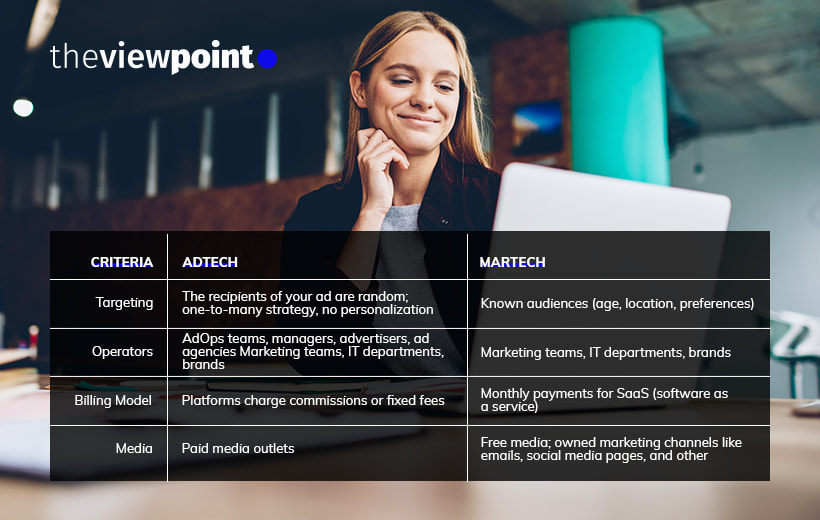
Tell Adtech From Martech: Top Distinctive Features and Definitions
The confusion between martech and adtech is quite natural. Even professional marketers are prone to lump these terms together. It is not easy to split these two up, just like trying to tell the difference between marketing and advertising. What advertising is for marketing and visa versa? They intersect, being parts of one another. The same applies to adtech and martech. To put it simply, martech is more about marketing tools, while adtech is more about delivering the right content at the right time to the right consumers.
What is Martech?
Martech can be defined as follows: It is a range of tools you use to create content, track the efficiency of your strategies, gather and analyze customers’ data, and control the workflow. In a word, all tools that you use to process information about your campaigns are covered by martech. This is a software package that implements features, analyzes performance, and measures the results. With its help, you can target current or potential buyers, lead them to your website, and encourage them to make a purchase.
This set of instruments allows you to communicate with visitors in a personalized manner, taking their previous choices, preferences, demographic information, and other details into consideration. Unlike adtech, martech is more personalized and aims at every customer in particular. Still, confusion between martech and adtech takes place right here. Advertising is a part of marketing and what is more – it is the visible part of it. Marketers confuse these terms just because it is hard to differentiate between the two streams. So let’s continue our investigation.
What is Adtech?
Adtech is a set of instruments and software that allows advertisers to set up, strategize and manage their digital campaigns. Managers use adtech to sell the winning ad environment to those who want to make their content visible. Adtech can therefore be summarised in a couple of words: these are special technologies that make buying and selling operations happen. They include databases where customers’ data is stored, ad exchanges, supply, and demand platforms. The ad space sold to advertisers enables their content placement in front of the target audience. While adtech allows broad market coverage, it doesn’t provide any communication with clients. You simply telecast your promotions to them. Adtech doesn’t interact with buyers or encourage them to make particular moves, it informs them about your existence and offers.
Still, advanced adtech tools allow advertisers to interact with a specific audience. They help to target customers that are interested in their services and products, reducing costs on ads. While ad campaigns are usually costly, adtech could reduce your budget.
Martech VS Adtech: What are the Differences?
Indeed, the line between these two is blurry. Let’s put it simply: adtech is a category of martech, just like advertising is a category of marketing. At the same time, these terms are not interchangeable. Some tools coincide, while others are completely different. That is why it is necessary to distinguish between these technologies – you need to make the most of each, without missing or duplicating processes. Perceive them as two separate toolkits and combine wisely to keep an eye on your audience and offer something that they really want even before they realize it!
The differences between adtech and martech become clearer when you consider the following aspects:
- Functions
As such, this technology helps marketers to create ads and spread them across various groups of people. They allow you to “meet” your typical buyer, learn his/her needs, and adjust your strategies considering this data. It includes all the metrics: clicks, views, impressions, sales, new customers, returning ones, etc.
Martech includes such tools as SMM, surveys, A/B testing, etc. This technology leads your customers from their first steps to purchase, serving and directing them in a process. They will receive follow-up emails, special promotions and offers, and other materials that are formed on the basis of their previous actions. Martech is highly-analytical and insightful.
- Platforms
Digital marketing and advertising benefit from different platforms, used for data processing, but in most cases, each field sticks to its own. For instance, only martech uses email tools, while advertisers turn to supply-side platforms like TheViewPoint.
Adtech Platforms
- SSP (Supply-side platforms)
With the help of this digital ad technology, publishers sell their space to advertisers safely and efficiently. SSP allows the latter to get the most of the ad environment and get better insights into their customers’ behavior.
- DSP (Demand-side platforms)
DSP allows advertisers to buy inventory from SSPs and exchangers on an impression-by-impression basis. This technology is used to ensure better targeting since it works with data brokers and data-management resources.
- SEM (search engine marketing platforms)
SEM promotes sites and improves their ranking on Google. They are all about paid-ads, those that you see on the top of a Google search page.
- Advertising network
Advertising networks redeem remnant space from publishers, pack it with adtech software, and sell to advertisers. As such, advertisers’ content appears on various websites, videos, and other online digital materials. The sellers get rid of remnant space and receive significant income for that, while the advertisers get something they were looking for – the attention of their potential buyers.
- Ad monetization platforms
Ad monetization platforms connect publishers and advertisers. Traditionally, a seller provides inventory, while an advertiser uses DSPs to place their requests.
Such platforms as TheViewPoint should be considered by advertisers and CTV publishers since they allow sellers and buyers to make fruitful deals without involving middlemen. Publishers get an opportunity to sell their ad space directly, while advertisers benefit from transparent ad spending and tracking. TheViewPoint provides an ad server and numerous monetization solutions.
Martech Platforms
- SEO platforms
While SEM belongs to adtech, all SEO tools for keyword research and audit belong to martech software. SEO specialists and marketers use these tools to improve their website’s visibility and make them rank higher in the list of Google search results. What is more, they provide tools for measurement, so you can grasp the current efficiency and find the weak spots in your strategy easily.
- Data analytics platforms
These platforms allow marketers to gather and process data about the efficiency of their decisions. They provide reporting opportunities as well as advanced optimization insights. Data analytics platforms aim at improving website’s performance and conducting in-depth research.
- CRM (customer relationship management platforms)
CRM platforms help marketers process customers’ data. The most advanced ones provide an incredible amount of useful information. With its help, marketers make their campaigns more targeted and appealing. They work with every client individually and improve their buying experience, ensuring higher conversion.
- Marketing automation platforms
Automation frees marketers from manual work and helps them to streamline most of the processes on multiple channels. A marketing automation platform can replace an entire sales department: it sets up the campaigns that are triggered automatically at the right moment, based on particular criteria. For example, your software can send thousands of automated personalized messages to each customer without you having to manually do this.
Conclusion
Cross-channel digital advertising requires a complex approach and strategy. Adtech and martech offer lots of tools to help marketers manage the daily hassle, from display advertising to personalized email marketing. To reach the top results, brands must pay attention to marketing and advertising, synchronizing data retrieved by means of all accessible technologies. Integration of the tools enabled by these two technologies will lead to colossal results, giving brands massive opportunities. To learn the art of incredible sales, consider adtech and martech as a part of your business strategy!
In conclusion, we will list the properties and differences of both in a table:


